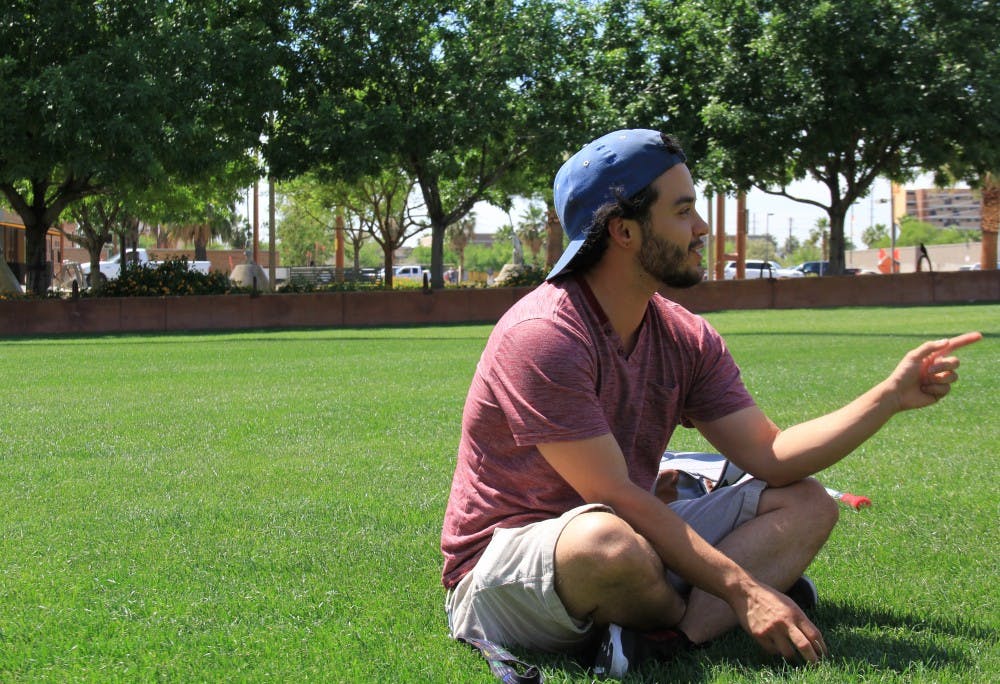ASU junior Ira Sanchez, 27, was recently mistaken as a homeless person by a security guard while meditating at Civic Space Park on the Downtown Phoenix campus.
The misunderstanding was clarified shortly after when city officials released a statement that said people are allowed to sleep on the grass during park hours and security only approaches patrons if they have concerns about their welfare.
“Civic Space Park is a popular location in downtown Phoenix," the statement read. "The safety and well-being of park users is of the highest importance, and security personnel at this location will interact with guests of the park if they feel there is a concern about an individual’s welfare.”
However, while Sanchez currently lives in on-campus housing on the ASU Tempe campus, he said he has faced homelessness multiple times in his past.
When Sanchez started school at ASU in the fall of 2015, he was juggling the normal responsibilities of work and school, with the added stress of on-and-off homelessness.
Sanchez said he was kicked out of his home during his senior year of high school for being transgender. He also said his parents are very religious, and his mother thought Sanchez was “inviting the possibility for demon possession to take place in the household.”
Sanchez said his parents wouldn’t let him take anything that they bought with him when he was forced to leave home, including the gifts he received at his bar mitzvah. He said they let him live with them back and forth for almost a year and a half.
“That sucked in a way,” he said. “You get emotional freedom at the cost of financial security.”
In 2013 Sanchez attended Phoenix College because he earned a scholarship which was large enough to support him. He said now he’s just trying to get through the second half of his college education.
Sanchez said he has restarted the first semester of his junior year three times because it was too difficult to balance homelessness, trying to find resources to fund his education, work and school.
“I actually had to fight to be able to apply to ASU," he said. "I couldn’t afford it. They wouldn’t waive my application fee. Then I ended up leaving a very scathing voicemail for the head of admissions, and then my application fee was waived the next day. I think I said something along the lines of ‘Are you trying to tell me I’m literally too poor to even think about going to ASU?’”
Homeless student used ASU resources to gain housing from The State Press on Vimeo.
Sanchez said he has accepted his past because it’s not his responsibility to keep his family together.
“It was definitely really emotionally tormenting in the moment,” he said. “There’s no undoing it. I’m happier and more emotionally stable than I’ve ever been with my family.”
Sanchez said ASU’s Student Advocacy and Assistance office helped him find housing for this semester, but he is still in the process of finding out where he will live next semester. He also said the student advocate for Barrett on the downtown campus helped him waive his fee for Barrett, the Honors College.
ASU media relations wrote in an email that the Student Advocacy and Assistance Office “serves as a conduit to assist students and resolve educational barriers, difficulties or personal concerns to ensure that they have a successful educational experience.”
ASU media relations also wrote that the office will help connect students with the resources needed for their particular situation. They wrote that they encourage students with difficult life situations to reach out to the Student Advocacy and Assistance office to discuss their options.
“I think it’s important to note that while ASU has these resources, and that’s cool, getting them is so time-consuming and stressful,” Sanchez said. “Figuring out who to talk to for what, it detracts from one’s ability to focus on school.”
Elijah Chevalier, 19, who used to live with Sanchez in Flagstaff, said he considers Sanchez a brother despite not being biologically related, because the Chevalier family adopted Sanchez after he was disowned by his family.
Chevalier said he met Sanchez in person when he was 14 years old at Phoenix Pride, but they had been conversing online long before that. He said they bonded because they were both transgender and activists.
Sanchez stayed with Chevalier and his family off and on in 2012 before applying and studying at Phoenix College from 2013-15.
“We sort of adopted him into the family,” Chevalier said. “He was living on his own in an apartment in a housing program that was run through this queer organization called One n Ten. So whenever he was in between housing, he would live with me and my mom and all of us.”
Chevalier said he also knew what it was like to be homeless.
“I used to be very comfortable, and then one of my parents got incarcerated,” he said. “(Sanchez) was disowned by his family. We’re all poor people of color. We’re there for one another.”
Tierra McKinney, a junior studying social work, said she met Sanchez in a social work class and found out about his experiences with homelessness in a class discussion.
“My reaction to that was that I was amazed because he’s such a positive and upbeat person,” she said. “I would never think he was homeless.”
As a single mother, McKinney is no stranger to financial stress, and said Sanchez helped her find financial support.
“I was amazed that (ASU) has so many different resources for the homeless," McKinney said. "Because living in Arizona, the resources for the homeless population are very slim. So I feel like ASU has done a good job.”
Reach the reporter at anbuechl@asu.edu or follow @alexa_buechler on Twitter.
Like The State Press on Facebook and follow @statepress on Twitter.




